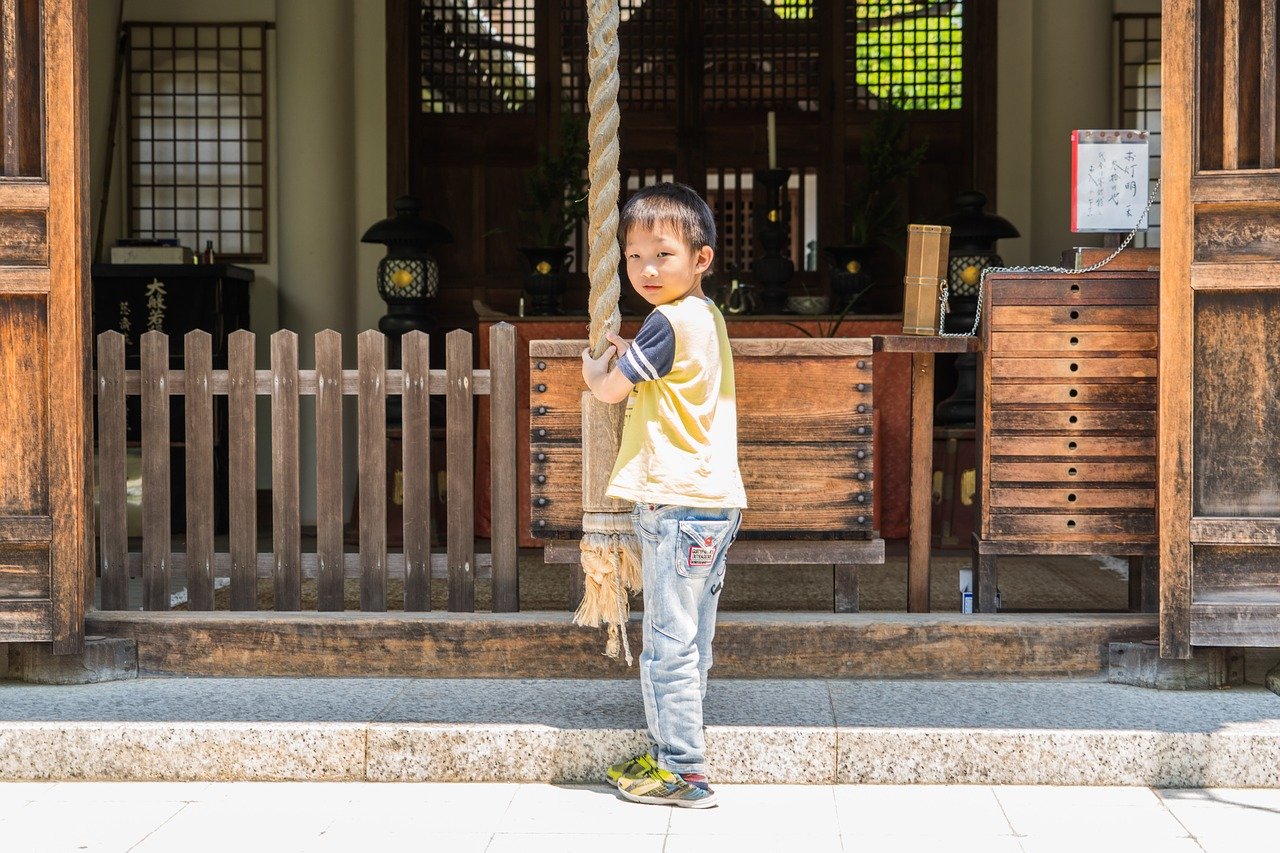どんな人ですか。 Don’na hito desu ka. What’s she like? Describing People in Japanese
In this blog post we’ll look at vocabulary and expressions related to describing people in Japanese. This post will go into more advanced vocabulary than our post on basic descriptions of people. First we’ll see some examples of things you might say about how you’ve met a friend. Then we’ll look at how to describe someone physically. After that we’ll learn how describe people’s personalities. Next we’ll see some vocabulary and expressions for talking about people you like, and people you don’t like so much. Finally we’ll see some ways to talk about people’s habits, talents, and interests. Ready?
Introducing Friends in Japanese
First we’ll start with phrases you can use to introduce people and say how you know each other.
- こちらは私の友人です。
Kochira wa watashi no yuujin desu.
This is my friend. - 職場が一緒です。
Shokuba ga issho desu.
We work together. - 職場が一緒でした。
Shokuba ga issho deshita.
We used to work together.
- 学校が一緒です。
Gakkou ga issho desu.
We go to school together. - 学校が一緒でした。
Gakkou ga issho deshita.
We went to school together. - どこで知り合いましたか。
Doko de shiriaimashita ka.
Where did you meet each other? - {大学・パーティー・バー・カフェ}で知り合いました。
{Daigaku/Paatii/Baa/Kafe} de shiriaimashita.
We met at university/at a party/at a bar/at a coffee shop. - 共通の友人がいました。
Kyoutsuu no yuujin ga imashita.
We have mutual friends. - もう何年もの付き合いです。
Mou nan’nen mo no tsukiai desu.
We’ve known each other for years. - 幼馴染です。
Osananajimi desu.
We grew up together. - ご近所同士です。
Gokinjo doushi desu.
We’re neighbors.
Describing People Physically
Second, let’s look at some ways to describe people physically.
- どんな見た目ですか。
Don’na mitame desu ka.
What does he/she look like? - 背が高いです。
Se ga takai desu.
He’s/She’s tall. - 背が低いです。
Se ga hikui desu.
He’s/She’s short. - {かっこいい・きれいな}人です。
{Kakkoii/Kireina} hito desu.
He’s/She’s good looking. - 痩せています。
Yasete imasu.
He’s/She’s thin. - 太っています。
Futotte imasu.
He’s/She’s fat. - 若いです。
Wakai desu.
He’s/She’s young. - 年配の方です。
Nenpai no kata desu.
He’s/She’s old. - 引き締まった体つきをしています。
Hikishimatta karadatsuki o shite imasu.
He’s/She’s in shape. - 運動不足気味です。
Undou busoku gimi desu.
He’s/She’s out of shape.
Describing People’s Hair
Next let’s look at how to talk about different ヘアスタイル heasutairu hairstyles.
- 髪が短いです。
Kami ga mijikai desu.
He/She has short hair. - 髪が長いです。
Kami ga nagai desu.
He/She has long hair. - 髪がストレートです。
Kami ga sutoreeto desu.
He/She has straight hair. - カーリーヘアです。
Kaarii hea desu.
He/She has curly hair. - {金髪・髪が黒い}です。
{Kinpatsu/Kami ga kuroi} desu.
He/She has blond hair/black hair. - {赤毛・髪が茶色い・白髪混じり}です。
{Akage/Kami ga chairoi/Shiraga majiri} desu.
He/She has red hair/brown hair/gray hair. - 三つ編みをしています。
Mitsuami o shite imasu.
She has braids. - 禿げています。
Hagete imasu.
He’s bald. - {口ひげ・あごひげ}があります。
{Kuchihige/Agohige} ga arimasu.
He has a mustache/beard.
Describing People’s Personalities
Now let’s learn some vocabulary for talking about personality types.
- どんな性格ですか。
Don’na seikaku desu ka.
What kind of personality does he/she have? - 恥ずかしがり屋です。
Hazukashigariya desu.
He’s/She’s shy. - 社交的です。
Shakouteki desu.
He’s/She’s outgoing. - まじめです。
Majime desu.
He’s/She’s serious. - 心配性です。
Shinpaishou desu.
He’s/She’s anxious. - のんびり屋です。
Nonbiriya desu.
He’s/She’s relaxed/easy-going. - 明るい性格です。
Akarui seikaku desu.
He’s/She’s a happy person. - 暗い性格です。
Kurai seikaku desu.
He’s/She’s an unhappy person. - 几帳面です。
Kichoumen desu.
He’s/She’s very organized. - 前向きな性格です。
Maemukina seikaku desu.
He’s/She’s an optimist. - 後ろ向きな性格です。
Ushiromukina seikaku desu.
He’s/She’s a pessimist.
Describing People in Japanese Who You Like
If you like someone, 性格の長所 seikaku no chousho positive personality traits are probably something you would use to describe them.
- 性格がいいです。
Seikaku ga ii desu.
He/She has a great personality. - 大好きです。
Daisuki desu.
I like her/him a lot. - 親しい友人です。
Shitashii yuujin desu.
He/She is a good friend. - とても面白い人です。
Totemo omoshiroi hito desu.
He’s/She’s very interesting. - とても元気な人です。
Totemo genkina hito desu.
He’s/She’s very cheerful. - いつも明るい人です。
Itsumo akarui hito desu.
He’s/She’s always in a good mood. - とても気さくな人です。
Totemo kisakuna hito desu.
He’s/She’s very nice. - 誠実な人です。
Seijitsuna hito desu.
He’s/She’s a loyal friend. - 思いやり深い人です。
Omoiyaribukai hito desu.
He’s/She’s thoughtful of others. - 考え方が柔軟な人です。
Kangaekata ga juunan’na hito desu.
He’s/She’s open-minded. - 控えめな性格の人です。
Hikaemena seikaku no hito desu.
He’s/She’s modest. - 誰とでもうまくやっていける人です。
Dare to demo umaku yatte ikeru hito desu.
He/She gets along with everyone.
Describing People in Japanese Who You Don’t Like
On the other hand, if you don’t like someone, 性格の短所 seikaku no tansho negative personality traits are what you’d use to describe them.
- 好きではありません。
Suki dewa arimasen.
I don’t like him. I don’t like her. - 不愉快な気分にさせられます。
Fuyukaina kibun ni saseraremasu.
He/She annoys me/gets on my nerves. - いつも機嫌が悪いです。
Itsumo kigen ga warui desu.
He’s/She’s always in a bad mood. - {意地悪・そっけない}です。
{Ijiwaru/Sokkenai} desu.
He’s/She’s mean/unfriendly. - 頑固です。
Ganko desu.
He’s/She’s stubborn. - 心の狭い人です。
Kokoro no semai hito desu.
He’s/She’s closed-minded. - つまらない人です。
Tsumaranai hito desu.
He’s/She’s dull/boring. - 自分勝手な人です。
Jibun kattena hito desu.
He’s/She’s selfish. - 傲慢な人です。
Gouman’na hito desu.
He’s/She’s arrogant. - 信頼できない人です。
Shinrai dekinai hito desu.
He’s/She’s not trustworthy. - 思いやりのない人です。
Omoiyari no nai hito desu.
He’s inconsiderate. - 嫌われ者です。
Kirawaremono desu.
He’s/She’s a jerk!
Describing People’s Habits
Now let’s move on to describing people by talking about their 癖 kuse habits.
- いつもニコニコしています。
Itsumo nikoniko shiteimasu.
She smiles all the time. - 全然笑顔を見せません。
Zenzen egao o misemasen.
She never smiles. - いつも笑っています。
Itsumo waratte imasu.
He laughs all the time. - 全然笑いません。
Zenzen waraimasen.
He never laughs. - 働き者です。
Hatarakimono desu.
She works very hard. - 怠け者です。
Namakemono desu.
He’s lazy. - 文句ばかり言っています。
Monku bakari itte imasu.
She complains a lot. - 決して文句を言わない人です。
Kesshite monku o iwanai hito desu.
She never complains. - 楽しいことをしたがらない人です。
Tanoshiikoto o shitagaranai hito desu.
He never wants to do anything fun. - いつも楽しいことをしたがっています。
Itsumo tanoshii koto o shitagatte imasu.
She always wants to do something exciting. - よく運動をしています。
Yoku undou o shite imasu.
She works out a lot. - ゲームばかりしています。
Geemu bakari shite imasu.
He plays too many video games. - 決まりを守る人です。
Kimari o mamoru hito desu.
He always follows the rules. - 自分がしたいことをする人です。
Jibun ga shitai koto o suru hito desu.
She does whatever she wants. - 友人とよく出掛けます。
Yuujin to yoku dekakemasu.
She goes out with her friends a lot. - 家に籠るのが好きな人です。
Ie ni komoruno ga sukina hito desu.
He likes to stay home. - たくさんスポーツをします。
Takusan supootsu o shimasu.
She plays a lot of sports. - 読書家です。
Dokushoka desu.
He reads all the time. - 素敵なパーティーをよく開きます。
Suteki na paatii o yoku hirakimasu.
He throws great parties. - 友人のために尽くす人です。
Yuujin no tame ni tsukusu hito desu.
She does a lot for her friends.
Describing People’s Talents and Interests
Finally, people have different 才能 sainou talents and 興味 kyoumi interests, and sometimes we describe people by saying what they’re good (or not so good!) at.
- 頭がいいです。
Atama ga ii desu.
He’s/She’s smart/intelligent. - {歴史・言葉・アート・映画}に興味があります。
{Rekishi/Kotoba/Aato/Eiga} ni kyoumi ga arimasu.
He’s/She’s interested in history/languages/art/movies. - {文を書くの・料理・絵を描くの・歌}がとても上手です。
{Bun o kakuno/Ryouri/E o kaku no/Uta} ga totemo jouzu desu.
He/She writes/cooks/paints/sings very well. - 多趣味です。
Tashumi desu.
He/She has a lot of hobbies. - 動物好きです。
Doubutsu zuki desu.
He/She loves animals. - 旅行が好きです。
Ryokou ga suki desu.
He/She loves to travel. - 友人と過ごすのが好きです。
Yuujin to sugosuno ga suki desu.
He/She loves to spend time with friends. - テニスが上手です。
Tenisu ga jouzu desu.
He’s/She’s good at tennis. - テニスが下手です。
Tenisu ga heta desu.
He’s/She’s terrible at tennis. - 音楽の才能があります。
Ongaku no sainou ga arimasu.
He’s/She’s gifted musician. - {歌・ダンス}が上手じゃありません。
{Uta/Dansu} ga jouzu ja arimasen.
He/She can’t sing/dance well. - とてもクリエイティブな人です。
Totemo kurieitibuna hito desu.
He’s/She’s very creative. - あまりクリエイティブな人ではありません。
Amari kurieitibuna hito dewa arimasen.
He’s/She’s not very creative. - 好きになると思います!
Suki ni naru to omoimasu!
You would really like him/her!
Get on the road to speaking Japanese with the Language Garage!
We hope you enjoyed learning how to describe people in Japanese. If you’d like to learn more, check out our other posts on Japanese language, culture, and more. And if you’re looking for convenient and affordable live Japanese lessons with a real teacher, check out the Language Garage. Our lessons are given online in a virtual classroom, so it doesn’t matter where you live or work – we can come to you. And we have flexible options, with a free trial so that you can decide if there’s a fit. Check us out!
Image by Michelle Maria from Pixabay.






